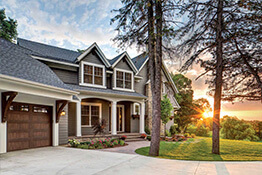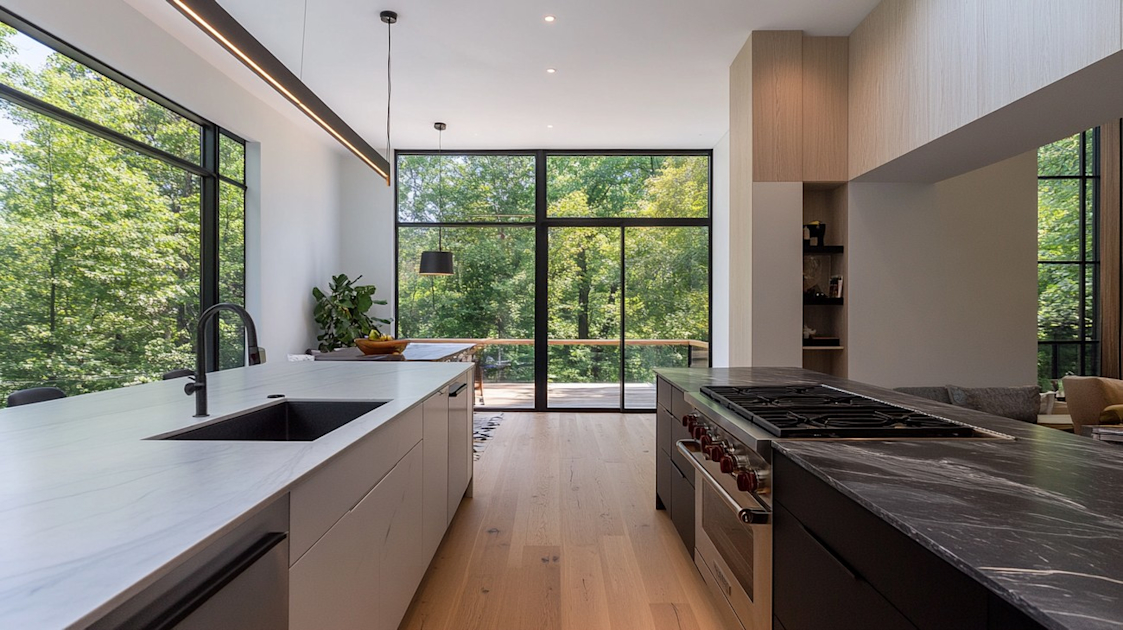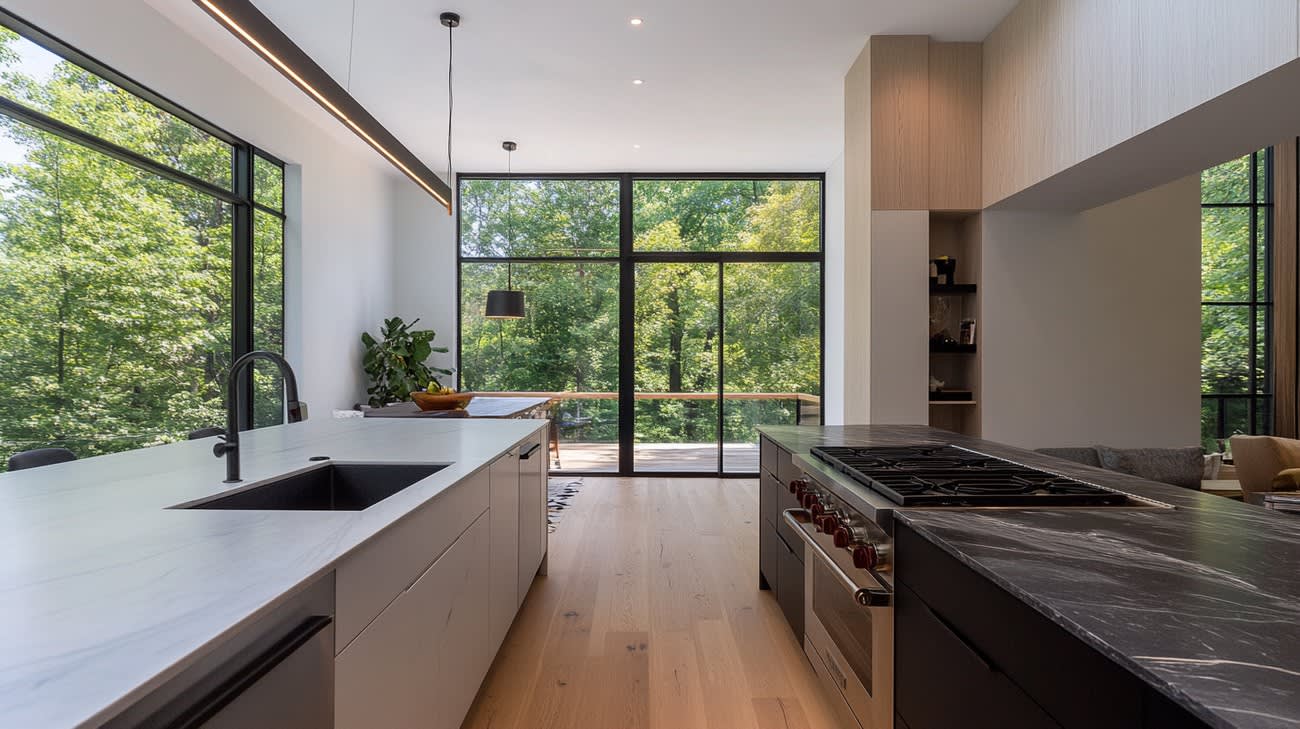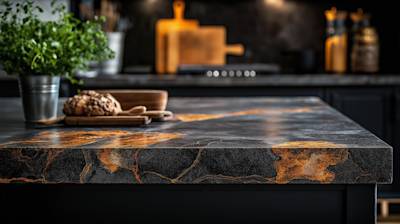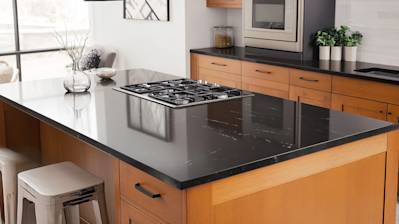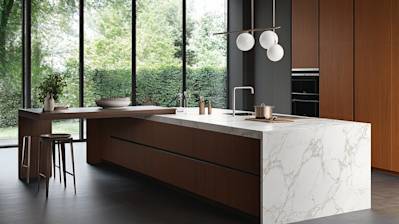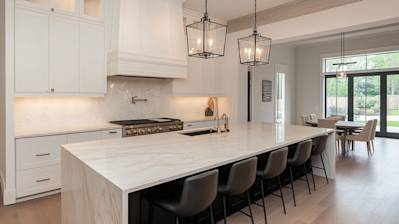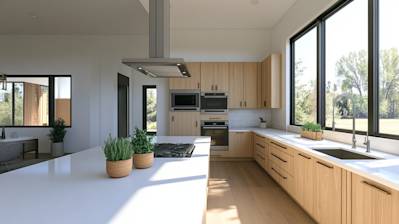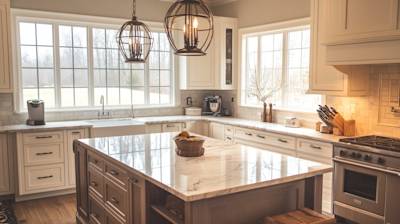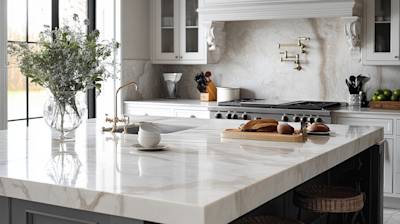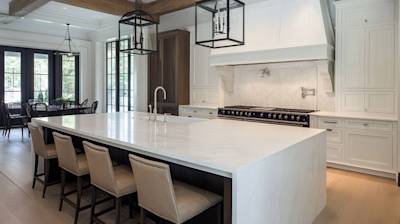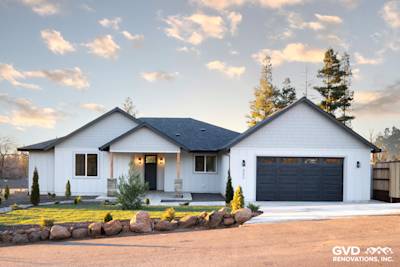So, you're planning a kitchen makeover and you’re considering soapstone countertops? Excellent choice! They not only adorn your kitchen but also offer unmatched durability. In this comprehensive guide, we aim to cover everything about soapstone countertops.
Understanding Soapstone Material
Soapstone, a metamorphic rock, consists of talc, chlorite, and dolomites, among other mineral combinations. The high talc content gives it a milky appearance and soapy feel, hence the name 'soapstone.'
While truthfully, soapstone is softer than granite or quartz, it is also denser. It is due to this unique character that soapstone resists bacteria and stains, making it a gorgeous and sensible choice for kitchen countertop use.
Soapstone Physical Characteristics
Unlike other natural stone countertops, soapstone
- is naturally grey, blue, or green
- features bold veining
- doesn't need sealing
- isn't harmed by hot pots or citrus spills
- is soft to touch and warm
All these features give soapstone countertops their unique charm that only becomes better with age and use.
The Cost of Soapstone Countertops
The charm of soapstone countertops comes with a price tag, but its splendour and a range of benefits make it worthwhile.
The cost can vary depending on factors such as:
- The thickness
- The quality of the stone
- The fabrication complexity
- The region
Typically, soapstone countertops cost per square foot lies in the range of $70 to $120, including installation.
The Installation Process
These countertops are serious business, and they are typically heavier than other stone countertops. So, without professional help, installation can be tricky. The steps involved are:
- Measurement: Taking accurate kitchen measurements is essential for seamless countertop installation.
- Template creation: A cardboard or wooden template is created based on the kitchen measurements to prevent costly mistakes during the cutting phase.
- Cutting the soapstone slabs: Based on the template, the slabs are cut into the desired shape.
- Fitting & Cutting sink hole: The cut slabs are dry-fitted on the cabinets. The hole for the sink is also cut at this stage.
- Final fitting: The slabs are then finally installed using construction adhesives and screws, and the seams are filled with epoxy resin.
Although DIY soapstone countertop installation is possible, hiring professionals is recommended. They have the necessary experience and tools to handle the heavy stone and cut it accurately.
Care & Maintenance of Soapstone Countertops
For everyone who dreads high-maintenance kitchen components, rejoice! Soapstone countertops require minimal care.
- Cleaning: All you need is mild soap and warm water to wipe the surface clean.
- Oil Application: Although not mandatory, many homeowners like to apply mineral oil to darken the soapstone and make its veining more pronounced.
- Repairing scratches: Being soft, soapstone is prone to scratches, but they can be easily sanded out.
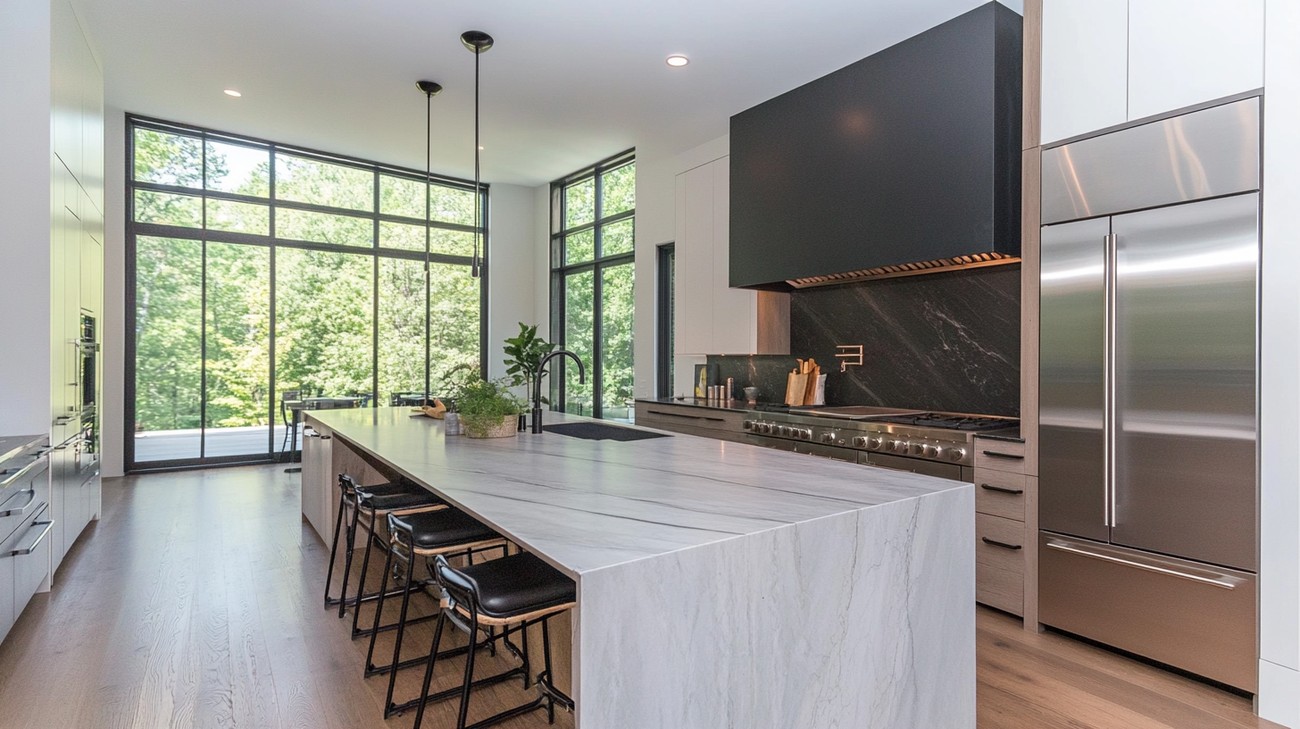
Frequently Asked Questions about Soapstone Countertops
What makes Soapstone Countertops different from other materials?
Soapstone countertops have a unique feel, as compared to granite or marble. It's naturally nonporous, making it resistant to stains and bacteria. This property also makes it heat-resistant, making it an excellent choice for the kitchen. Its texture is also softer and more welcoming to the touch.
How do you maintain Soapstone Countertops?
Maintaining your soapstone countertops is quite simple. You just need to regularly clean it with a mild soap and water solution. Soapstone is quite durable so it doesn't require sealing like other natural stone countertops. However, you can periodically apply a mineral oil finish to darken its color and enhance its natural patina.
Are Soapstone Countertops durable?
Yes, soapstone countertops are very durable. They're heat resistant and not affected by acids like citrus and vinegar, unlike some other natural stone countertop materials. However, soapstone is softer than granite and marble, so it may scratch more easily. This is considered part of its natural charm and can easily be buffed out with sandpaper.
Can you use Soapstone for outdoor countertops?
Absolutely. Soapstone countertops are a versatile choice for outdoor use. Thanks to their nonporous nature, they're resistant to weather elements and do not discolor, craze or deform under constant UV exposure, making them ideal for outdoor kitchens or barbecue areas.
How are Soapstone Countertops installed?
The installation process for soapstone countertops is similar to that of other stone countertops. It involves measuring the counter space accurately, cutting the soapstone to fit, and securing it in place. It's recommended to have your soapstone countertops professionally installed to ensure a accurate and secure fit.
What is the cost of Soapstone Countertops?
The cost of soapstone countertops varies based on factors such as thickness, color, and the complexity of your installation. However, you can generally expect to pay between $70 and $120 per square foot.
How do Soapstone Countertops compare with Granite or Marble countertops?
In terms of aesthetics, soapstone offers a more unique and rustic look as compared to the polished finish of marble or granite. It's softer to touch and tends to darken naturally over time. In terms of durability, while granite and marble might be harder, soapstone fares better with heat resistance and doesn't react to acids.
Where can I buy Soapstone for Countertops?
Soapstone countertops can be purchased from a variety of sources, including home improvement stores, kitchen and bath boutiques, and online retailers. For the best results, it's recommended that you see and touch the stone in person before making your purchase.
What colors does Soapstone Countertops come in?
Soapstone generally comes in a range of greys from light to very dark, almost black. Some varieties may have subtle veining or flecks of green, blue, or brown, which can add beautiful complexity to its look.
Can I cut directly on the Soapstone Countertops?
As soapstone is softer than granite and marble, it's not recommended to cut directly onto your soapstone countertop. While minor scratches can be sanded out, heavy knife marks could require professional remodeling. Always use a cutting board to protect the longevity of your counters.

Pros of Soapstone Countertops
Durability
One of the significant advantages of soapstone countertops is their durability. Soapstone is naturally very strong and resists heat well. That means you can put hot pots and pans directly onto your soapstone countertops without worrying about causing damage or staining. The robustness of this material makes it a popular choice for those who love to cook and need a countertop that can withstand a lot of use.
Aesthetics
Another pro of soapstone countertops is their beauty. Soapstone comes in a variety of natural shades, with each slab having a unique vein pattern. Each piece is unique, lending your kitchen or bathroom a unique and ever-changing look. Not only that, but soapstone tends to darken over time, creating a patina that many homeowners find extremely appealing.
Maintenance
Soapstone countertops are non-porous, meaning they won't absorb liquids and are resistant to stains. Any spills can be wiped away with a damp cloth, leaving your countertop looking as good as new. Furthermore, soapstone doesn't require sealing like other natural stone countertops, reducing the maintenance workload.
Eco-friendliness
Soapstone is a natural material that doesn’t release any harmful emissions during its manufacturing process. This fact makes it an eco-friendly choice for those conscious about their impact on the environment.
Cons of Soapstone Countertops
Price
The cost of soapstone countertops can be considered a con. Due to the long-lasting durability and unique appearance of soapstone, it is more expensive than some other countertop options. The price also includes the expertise needed for fitting, which can be demanding due to the stone's weight and delicacy during installation.
Susceptibility to Scratches
While soapstone is resistant to heat and stains, it is softer than other stones like granite, meaning it is more prone to scratches. However, many homeowners don’t find this to be a significant drawback, attributing to the stone's character. Scratches can be sanded out or be left to contribute to the rustic, worn-in look soapstone develops over time.
Limited Color Options
Compared to other materials like quartz or granite, soapstone has a limited color palette. It typically comes in shades of gray or greenish-black. While this can be considered a con for those longing for bright colors in their kitchen, others find the natural, earthy tones of soapstone very appealing.
Care & Maintenance
Despite being low-maintenance concerning sealing or staining, soapstone does require regular oiling to maintain its luster and prevent it from drying out. While this isn't a particularly time-consuming or challenging task, it is a routine that some busy homeowners may not have the time for.
Availability
Soapstone is less common than other countertop materials, like granite or marble. As a result, it can be harder to find, especially in remote locations, which can lead to longer lead times and higher delivery costs.
Installation
Soapstone is one of the heaviest countertop materials. Its installation, therefore, requires skilled professionals to avoid any potential damage. Be prepared for the added expense and inconvenience of installation.
In conclusion, the decision to install soapstone countertops comes with its unique set of pros and cons. The decision ultimately boils down to individual preference regarding aesthetics, maintenance, and budget.

Myths and Misconceptions about Soapstone Countertops
There are numerous myths surrounding soapstone countertops that often complicate decision-making for homeowners considering remodeling their kitchen or bathroom spaces. These misconceptions usually emanate from a general misunderstanding of the unique characteristics, performance, and longevity of soapstone material. This section will debunk these myths and help clear the air regarding the versatility and practicality of soapstone countertops.
Myth 1: Soapstone Countertops are Fragile
Origins
Many homeowners believe that soapstone countertops are fragile and cannot stand the rigors of everyday kitchen chores.
Reality
Soapstone countertops are incredibly sturdy and resilient. They are less likely to crack or chip compared to other natural stone materials like granite or marble. Although soapstone is relatively softer, its structural integrity is unquestionable. It has been used for generations in laboratories due to its high chemical resistance, testament to its resiliency.
Myth 2: Soapstone Countertops Require High Maintenance
Origins
Some believe that soapstone countertops require constant sealing and maintenance, like some natural stone countertops do.
Reality
Soapstone is non-porous and naturally resistant to stains. It does not require sealing to keep it protected from spills or moisture. Some homeowners opt to periodically apply mineral oil to even out the stone's patina (natural darkening process), but this is aesthetic and not required for maintenance.
Myth 3: Soapstone Only Comes in Dark Colors
Origins
The belief that soapstone countertops only come in dark colors potentially stems from images of dark gray to black soapstone kitchens seen online or in magazines.
Reality
While it's true that soapstone does darken naturally over time to a charcoal gray to black, it initially comes in a variety of tones, including light gray, blue, and greenish hues.
Myth 4: Soapstone Countertops are Cost-Prohibitive
Origins
Some individuals are under the impression that soapstone countertops come with a hefty price tag, likely due to its luxurious reputation and high-end aesthetic.
Reality
While soapstone countertops aren't the cheapest option, they are far from being the most expensive. The cost mostly depends on the size and complexity of the installation and the specific type of soapstone.
Myth 5: Soapstone Countertops are Unfriendly to the Environment
Origins
The belief that soapstone countertops are not environmentally friendly may stem from concerns about quarrying practices and the energy used in extraction and production.
Reality
Soapstone is acquired from shallow quarries, making its extraction fairly low-impact compared to other materials. Additionally, because soapstone is durable and long-lasting, it doesn't need to be replaced frequently, reducing the overall material demand.
Myth 6: All Soapstone is the Same
Origins
This misconception may stem from the lack of awareness about the diversity in soapstone types and characteristics.
Reality
Not all soapstone is created equal. There are two main types: architectural and artistic. Architectural soapstone (used for countertops) is denser and more durable. It's also important to note that the quality and colors of soapstone can vary depending on the quarry location.
Myth 7: Food Preparation on Soapstone Countertops is Unsafe
Origins
This myth could be attributed to soapstone's softness and the belief that it could potentially harbor bacteria in its surface.
Reality
Soapstone is non-porous, meaning unlike some other countertop materials, it does not provide tiny spaces for bacteria or mold to hide and grow. This property also makes it easy to clean, further ensuring a safe, hygienic surface for food preparation.
With all these misconceptions debunked, it's clear that soapstone countertops are a nice, sturdy, and practical option for kitchens and bathrooms. Don't let these myths deter you from considering them in your next home renovation project.
Summary
So, you're ready to give your kitchen a makeover and soapstone countertops have caught your attention, right? Well, they surely make for a stylish and distinctive addition being naturally resistant to heat, stains, and bacteria. The dark, dramatic color, and the smooth, silky finish give your space an instant uplift, with a rustic yet elegant appeal. It may require oiling regularly for a uniform appeal but remember, the beautiful patina gained over years only adds to its unique character.
Moreover, soapstone countertops offer remarkable longevity. If you're someone who appreciates antiques, you'll love how it ages over time, taking on a unique charm like fine leather or precious metal. Also, it's forgiving to dropped dishes, and thankfully it doesn't require any harsh, toxic cleaners - just regular soap and water will do. A perfect blend of beauty and function!
All things considered, soapstone countertops can be the ideal pick when it comes to remodeling your kitchen space. They stand the test of time, adapting and evolving, much like our lives at home. While it may have some quirks and may not be for everyone, the ones who choose it generally fall in love with its dark beauty and individualistic nature. So, if you value a mix of practicality, aesthetics and a touch of old-world charm, you just might want to welcome these lovely countertops into your home!
About GVD Renovations & Remodeling
GVD Renovations & Remodeling is a trusted home improvement company based in Roseville, CA. We have been serving this community for several years, delivering high-quality renovation work that precisely meets our clients' expectations. We take great pride in our experienced team who are passionate about delivering an unmatched level of workmanship. Whether you need a simple upgrade or a massive home renovation, trust that GVD Renovations & Remodeling is your reliable partner, ready to convert your home into the space you've always dreamed of. We look forward to providing you with an excellent customer experience and a beautifully renovated home.
Tags: countertops, kitchen remodeling, natural stone,

